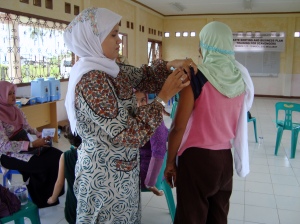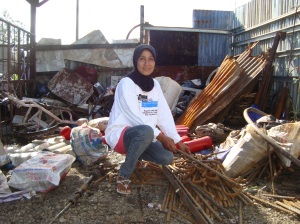Collecting recyclables in Indonesia is a good business for the informal sector. Unfortunately, scavengers, waste pickers and small recycling businesses have still much difficulty to access credit which is needed to invest in new equipment or storage facilities.
Since there are no schools to learn the job of “recyclist”, Terre des hommes Italia conducted last Spring a series of trainings for scavengers in the post-tsunami area of Aceh. Those trainings that were implemented within the framework of UNDP’s Tsunami Waste Management Livelihoods Program – Round III had a special focus on plastic sorting and business planning.
An important component of UNDP’s program is to increase the knowledge of people involved with recycling: itinerant buyers, waste pickers, scavengers, leaders and workers of small junkshops. The idea is that building the capacity of the informal recycling sector helps reduce the amount of waste being sent to the landfills and increase the livelihoods of many individuals.
From March to May, 270 “recyclists” were trained in Aceh by Terre des Hommes Italia. Learning about how the waste market works, how prices of recyclables are fixed, how to sort the material collected by type and quality, how to reduce health risks on the job, how to write a business plan were among the main topics. A total of 87 women and 183 men participated in the trainings.
Each participant attended a 3-day session. The first day was dedicated to the theory of waste; the second day to waste sorting and occupational safety; the third day to business planning. In the end of each session, tetanus injections were distributed to each participant, together with a small safety & protection kit including masks, gloves, caps, boots and a machete.
The trainings were facilitated by two local NGOs – Yayasan Paramadina Semesta (YPS) on the West Coast and Palapa Plastic Recycling Foundation (PPR) on the East Coast.
Most of the participants were pleased to learn more about plastics which compose a great portion of the total waste volume in Aceh.
Thermoplastics, for instance, that make up to 80% of the plastics produced today are divided in several groups (1 to 7), each of them having its own resin code. Depending on the group to which the plastic items belong, they have a different price on the market. In practice, by sorting plastics by type, colour and quality, one can get a better price when selling them to local traders.
Participants learned about the various types, quality and colours of plastics, and about the simple tests that can be used to distinguish them. Generally speaking, the key for successful recycling is the quality of the material collected. Factories are ready to pay a good price for uncontaminated and clean material.
Besides the theory on waste and plastic sorting, participants had the opportunity to visit a recycling point to put what they had learned in practice. Using their new tools and equipment, they were assisted by senior “recyclists” who gave them practical tips.
More about recycling plastics: click here







